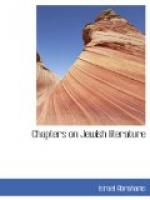But lo! my tears are dried,
when, fast outpoured,
They down my cheeks
are shed,
Scorched by the fire within,
because thy Lord
Hath turned and
sped.
Yea, I am desolate and sore
bereft,
Lo! a forsaken
one,
Like a sole beacon on a mountain
left,
A tower alone.
I hear the voice of singers
now no more,
Silence their
song hath bound,
For broken are the strings
on harps of yore,
Viols of sweet
sound.
I am astonied that the day’s
fair light
Yet shineth brilliantly
On all things; but is ever
dark as night
To me and thee.
* * * * *
Even as when thy Rock afflicted
thee,
He will assuage
thy woe,
And turn again the tribes’
captivity,
And raise the
low.
Yet shalt thou wear thy scarlet
raiment choice,
And sound the
timbrels high,
And glad amid the dancers
shalt rejoice,
With joyful cry.
My heart shall be uplifted
on the day
Thy Rock shall
be thy light,
When he shall make thy gloom
to pass away,
Thy darkness bright.
This combination of the poetical with the legal mind was parallelled by other combinations in such masters of “Responses” as the Sheshet and Duran families in Algiers in the fourteenth and fifteenth centuries. In these men depth of learning was associated with width of culture. Others, such as Moses and Judah Minz, Jacob Weil, and Israel Isserlein, whose influence was paramount in Germany in the fifteenth century, were less cultivated, but their learning was associated with a geniality and sense of humor that make their “Responses” very human and very entertaining. There is the same homely, affectionate air in the collection of Minhagim, or Customs, known as the Maharil, which belongs to the same period. On the other hand, David Abi Zimra, Rabbi of Cairo in the sixteenth century, was as independent as he was learned. It was he, for instance, who abolished the old custom of dating Hebrew documents from the Seleucid era (311 B.C.E.). And, to pass beyond the time of Karo, the writers of “Responses” include the gifted Jair Chayim Bacharach (seventeenth century), a critic as well as a legalist; Chacham Zevi and Jacob Emden in Amsterdam, and Ezekiel Landau in Prague, the former two of whom opposed the Messianic claims of Sabbatai Zevi, and the last of whom was an antagonist to the Germanizing tendency of Moses Mendelssohn.
Joseph Karo himself was a man of many parts. He was born in Spain in 1488, and died in Safed, the nest of mysticism, in 1575. Master of the Talmudic writings of his predecessors from his youth, Karo devoted thirty-two years to the preparation of an exhaustive commentary on the “Four Rows” of Jacob Asheri. This occupied him from 1522 to 1554. Karo was an enthusiast as well as a student, and the




